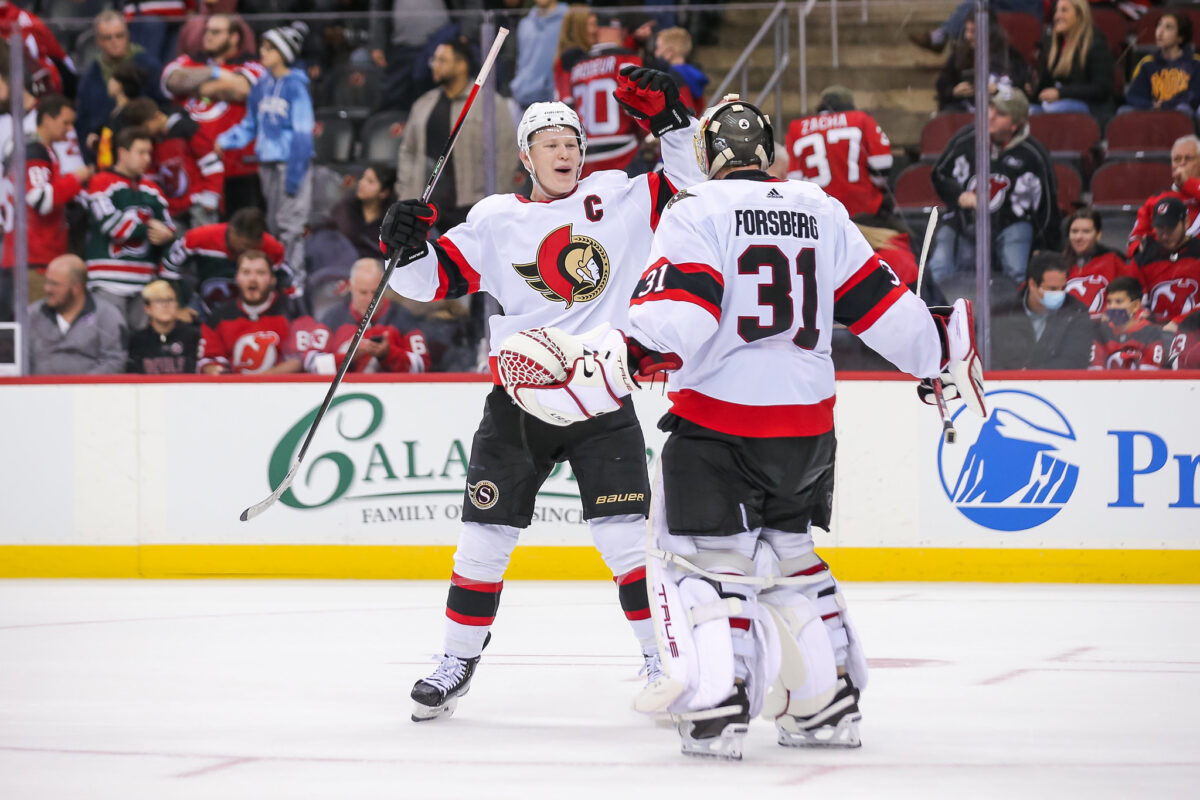Ottawa Senators captain Brady Tkachuk’s physical play can be reminiscent of the early days in which his father, Keith Tkachuk, patrolled the ice looking for violence, and then scoring chances.
Tkachuk set individual career-highs in goals (30), assists (37), points (67), and penalty minutes (117) last season. He was also 71st in the league with 2.45 points per game at even strength among the 470 players with at least 750 minutes played. That’s an impressive total, and hardly the peak for a player like him.
Physically, there simply wasn’t a player as talented as Tkachuk that dished out as many hits as he did in 2021-22, as the Senators’ forward recorded 12.87 hits per 60 minutes of even-strength play. That placed him 15th out of 470 players, right between Milan Lucic (13.47) and Tom Wilson (11.4). The three closest (physical) players in the top 100 points-per-game at even strength were Andrei Svechnikov at 65 with 9.96 hits-per-60, Ross Colton at 92 with 10.05, and Marcus Foligno at 100 with 14.36.
Related: Senators’ Goaltending Stabilized by Cam Talbot
Tkachuk’s ability to be exceptionally physical and still produce at a high rate isn’t something that happens often in today’s game. There is a limit, though, on just how impactful body checking can be when the speed and skill have evolved to the point where some players are nearly impossible to catch with a separation hit. As such, the more skilled the player is, the harder they are to collide with meaningfully.
Tkachuk Needs Selective Physicality
There is a clear value difference between hitting and removing from the play and a third or fourth-line forward compared to a first-line forward. Only one of those players will have a score-first mentality. The others are candidates for Tkachuk to skillfully ignore.

Take newly minted Columbus Blue Jackets forward Johnny Gaudreau for example, who was hit 1.7 times per 60 minutes at even strength in 2021-22 for the Calgary Flames. His teammate, Milan Lucic, was hit 5.27 times per 60 minutes at even strength. It’s much easier to catch Lucic with a body check than it is to hit Gaudreau, but it’s also highly probable that the player could simply take the puck from Lucic without contact easier than from Gaudreau.
For a talented skill player like Tkachuk, repeatedly distancing himself from the play without generating a possession change isn’t something the Senators should be thrilled about now that the focus is on winning games. When he hits someone, he removes himself from active play. There are very few players that he could collide with and it be an equal loss for the opposition as it is for the Senators, such as hitting Lucic over Gaudreau as previously mentioned.
The most common collision that has little to no effect on the forthcoming event is when a forward finishes a check on a defender who has already passed the puck. That defender presents no danger anymore, nor will they be actively involved in the next few events on the ice. It would be more useful for Tkachuk to turn down those opportunities in favor of going after the puck.
Tkachuk’s Overall Value Will Increase
The value of a body check is in separating the player from the puck. If Tkachuk’s booming collision doesn’t result in possession change or disruption of play, then he hasn’t really accomplished much other than giving fresh eyes control of the puck while removing himself from the play.
Related: 5 Senators’ Prospects Who Could Crack The Roster In 2022-23
The younger Tkachuk spends a significant amount of time making body contact, to the point where he can become a first-line talent who moonlights as a fourth-line checking forward. There isn’t a defined high mark that separates the number of useful hits from purely entertainment-based collisions, but I’d wager it’s somewhere between Tkachuk’s three-year average of 12.79 hits per 60 minutes of ice-time, and Alexander Ovechkin’s 6.78.
Tkachuk is a physical player – and that’s not going to change – but, from a team perspective, it would serve the Senators better if he reduced his hits by 25-50 percent. Even by cutting his 12.79 hits-per-60 by a quarter, he would still be one of the most physical players in the NHL, and he’d create more productive opportunities for himself and his teammates. The Senators have a chance to be a powerful offensive team, but only if the focus is on generating control and scoring chances while the team’s top players are on the ice.